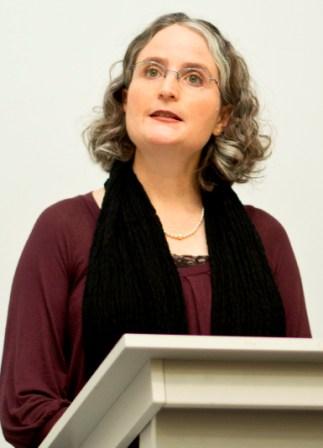
The 2011 recipient of the Vice-Chancellor’s Distinguished Research Award, Dr Samantha Vice, delivered an inspiring lecture, which focused on how to live a value-oriented life in post-apartheid South Africa, where the personal and the public, the past and the present are deeply entangled.
Her inspiring lecture was entitled "Living with the Past: Value, Hope and the Challenge of Cynicism" and functioned as a companion piece to her acclaimed paper “How Do I Live in This Strange Place?”.
The paper entitled How Do I Live in This Strange Place was a critical exploration of the contemporary role of white South Africans today. It led to a fascinating and critical national debate on whiteness in 2011.
In her lecture recently, Dr Vice argued that a hopeful attitude is “a moral choice to take a stand on the idea of a shared future”, to display a trust in the rule of law, democratic ideals and the notion of partaking in the responsibility for creating a shared future.
She interrogated the idea that our internal character is influenced by the context in which we find ourselves, and, in turn, influences that context.
She looked at two complex attitudes, those of cynicism and hopefulness. Dr Vice described these as dimensions of the self which act as filters and alter our perception of the world and outlined her theory on how these attitudes can be relevant in post-apartheid South Africa.
She said cynicism presupposes that all action is self-motivated, often resulting in the absence of the charitable impulse. In a transitional society, cynicism can be seen as a reasonable response, with the empty rhetoric and lack of progress provoking a world-weariness in both the less privileged and the privileged alike.
Cynicism acts as a self-protective mechanism due to its disengaged and suspicious nature. Hopefulness, as an alternative way of being in the world, expects, said Dr Vice, to see what is good, and therefore finds the good in the world more readily.
She further said integrity is a value most humans would acknowledge aspiring to; a short definition encompasses wholeness of the Self and an adherence to core beliefs and values.
Within this somewhat stilted meaning, dictators such as Hitler or Stalin could be said to be men of integrity, said Dr Vice. Cynicism seems a natural fit within such a narrow definition, however, it enables the view of the future to be construed only in terms of the past which has, as Dr Vice, pointed out, troubling political implications for a young democracy such as South Africa.
She said, if one thinks of integrity in a deeper sense, as being open to imaginative reinterpretation, hopefulness becomes an essential element of the integral life; a person of integrity can acknowledge that she may be wrong and can therefore be patient in her interpretations.
In so doing, the past is not given the power to doom both present and future, she said. An attitude based on hopefulness retains integrity and self-respect while not abdicating personal responsibility.
Hope, said Dr Vice, can be seen as staking a claim on the future of our society, of taking the past in a cautionary spirit rather than a predictive one, and as a reminder of our common frailty.
By Jeannie Mckeown
Photo by: Sara Garrun
